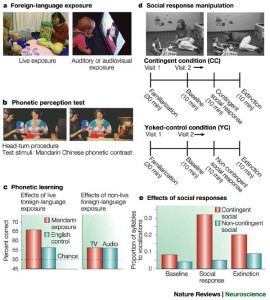As an international student, I am concerned about language learning. Whenever I find my English is not good enough and I should pay more efforts in learning it, I cannot stop wondering how we mastered language so easily as babies? As infants, we did not know anything and could not use one language to learn another, so how did we achieved the unbelievable accomplishment? Before conducting researches, I hypothesize that babies do the task mainly by staying around people who speak the language and gradually learning bit by bit every day.
As the speech code is so hard to crack, especially conducting experiments on infants, experimental studies are not so many. However, I found an author writing about several studies in one article and I want to share some of them which are easier to understand and focus one aspect of babies’ language learning– social learning. I think we cannot entirely fall back on what the author says, because one person’s words and experiments are not convincing enough to prove a point, and more researches from different people can provide higher credibility.
The first study I’m going to analyze shows that social learning plays a dominant part in language learning by conducting a speech experiment: Nine-month-old American infants are separated into four groups, two of them are control groups that are only exposed to English. The third group is exposed to Mandarin Chinese in twelve 25-min live or televised sessions while the last group “leads a Chinese life”– listening to four native speakers of Mandarin during twelve 25-min sessions in which the speakers read books to the infants and talking about toys that they show to the infants. After exposure, all of them were tested on a Mandarin phonetic contrast using the head-turn technique– infants were treated to turn heads when perceiving difference between Mandarin phonetic sounds. The results show “phonetic learning in the live-exposure group, but no learning in the TV- or audio-only group.”
(left part of the image is the first study I include)
I want to share some of my thoughts regarding this study:
- It did a good job allocating the infants into four groups that contain two experimental groups to contrast the phonetic learning progress between live- exposure and TV- or audio- only, and also two control groups to make comparison.
- It also tries to control other variables, for instance, the times of the exposure are the same: twelve 25-min sessions.
- The study has some flaws, for example, it does not demonstrate how many infants are being tested and whether they are selected randomly. So we do not know if the number is large enough and if third variables can be ruled out.
- The measure of testing babies’ phonetic learning is not persuasive enough. Though the article expresses that researchers train the infants to turn heads when they notice a difference phonetic sounds, babies are too little and may still turn their heads whenever they want to. Thus I do not think the test is convincing enough.

(left part of the image is the second study I include)
Another study I want to talk about is that infants hear a repeating prototype vowel (English or Swedish) while being entertained with toys; they are trained to turn their heads away from the assistant when they hear the prototype vowel change. It turns out that “Infants perceive more variants as identical to the prototype for native-language vowel categories, indicating that linguistic experience increases the perception of similarity among members of a phonetic category.” So from here we can get that linguistic experience helps babies with perception of the language. In other words, as I expected, the more babies are exposed to a language, the more they are going to learn about the language. However I still have to say that the experiment is not perfect. For instance, head turn is such an easy and random motion that babies can do even if they do not recognize a change in the vowel.
Yet it is a breakthrough for this unknown field as I admit it is difficult to design and conduct such experiments on babies. I think we can conclude that social interactions do play a significant role in infants’ language learning, but more flawless experiment are needed to back this point more compellingly.
Check out a cool video from TED talking about more discoveries regarding the topic! And I was excited to find that she mentioned the study I posted here 🙂



I agree that infants are very difficult to study because obviously they do not know any better. I also agree that social interaction affects the babies’ language abilities. Here is an experiment I found that shows how a parent “labeling” an object increases the child’s interest as opposed to a person just showing them an object. I think this further proves that how people interact with babies and the way they teach them affects them more than simply showing them something. They need that personal teaching relationship. Here is the study: http://www.human.cornell.edu/hd/outreach-extension/upload/casasola.pdf.